ITALY
REGION SICILY
The dances presented are excerpt from the paper “Ceremonial Dances in sicily” and two DVSs by Dr Giuseppe Biondo to whom we express our gratitude .
Dr Biondo writes :
The analysis conducted on ceremonial dances and their documentations of religious music, has made possible to highlight and classify various types of dances in Sicily found in specific geographical areas and marked by distinctive features. Classifying them through an analysis of homogeneous elements is what has been taken into consideration. We have grouped them into categories of dances that share the same names, types of training and figuration, also considering the type of subdivision of choreographic phrasing, gestures, and so on………The dances can be synthesized in the following types:
-The “dance of Candelmas”, (people perform dances with wooden structures called “Candelore”, widespread in the province of Catania)
-The “dance of the Giants”, made with big freaking puppets, spread in some municipalities of the province of Enna, Caltanissetta, Catania, Messina
-The “dance of the Saints”, performed by men carrying ‘fercoli’ (religious chariots) bearing the Sim Ulacra or relics of Saints, widespread all over Sicilian provinces;
– The “free dances”, performed in religious contexts (such as those who are performed in Sorrentini, Licata, Misterbianco, based on figures in a circle or spiral, with or without musical accompaniment)
– The dances performed by people with vegetal elements (branches, flowers, etc.).
– The dances of the wild man and anthropomorphic puppets
– The Carnival dances
Common characteristics of festival rituals can be found in various Sicilian towns, since many of them are within easy reach.
Despite the cultural transformations, dance, which seemed to be destined to disappear first in religious rituals, today, is widely attested all over the island in various festive occasions ….. the rites try to guarantee the maintenance of identity and social group membership
REGION SOUTH ITALY
The tammurriata is a traditional dance from Campania. It is part of the large family of traditional dances. The term tammurriata represents a complex family of dances performed to the rhythm of the traditional drum: the tammorra
The popular dances of southern Italy, especially those of Campania with the “tammurriata” are today experienced with processions for the Madonna. The dimension of the pagan tradition and that of the Virgin are united in these celebrations
On June 29 2024 Ms Barbara Sabella contemporary dancer, passionate about the dances of Southern Italy and member of the CID.held an online seminar with the contribution of Ms Silvia Armenio . We express our gratitude to both of them
We hope to enrich the informations on South Italy with the help of the association SUDANSARE
List of Dances
Dance of Candelmas Sicily
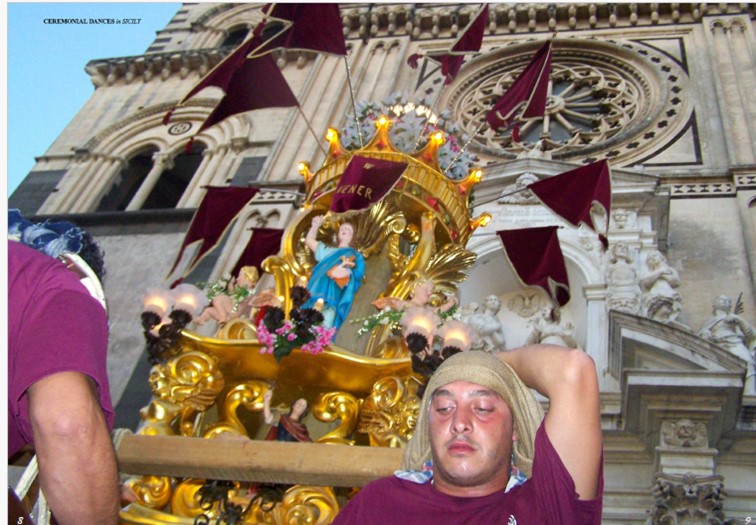
ITALY
Region: Sicily, Catania
Ethnic group : Sicilians
Spirituality: Catholic
For the Catholic Church, the Candlemas is the feast of the purification of Mary, celebrated on 2nd February. However, the origins of Candlemas have far distant roots in time., Herodotus described the frequent processions observed in Egypt, during which faithfuls carried high columns lit by wax fires burning
Actually, people perform dances with wooden structures called “Candelore”. The dances, called annacate (swingings),are still in use in Catania and its hinterland. there are many elements in common:
the names of their bearers, their disposal, used tools, clothing, training, types of figuration, choreographic gesture and used phrasings in annacate
Dance of Saints Sicily
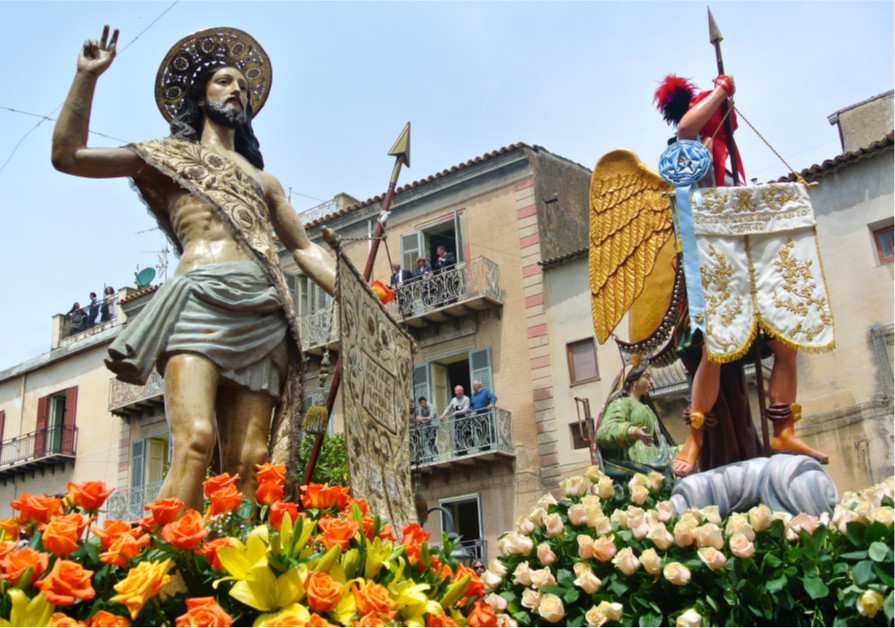
AUTHOR : Dr. Giuseppe Biondo
Read the full text pages 11-15
See the video1 40min à la fin
See the video2 début à 31min
ITALY
Region: Sicily( Enna, Caltanissetta, Catania, Messina)
Ethnic group : Sicilians
Spirituality: Catholic
The “dance of the Saints”, performed by men carrying ‘fercoli’ (religious chariots) bearing the Simulacra or relics of Saints, widespread all over the Sicilian provinces
the fercoli are carried on shoulder by the faithful, whose performance modes are characterized by an intense activity, which is unconventional and liberating (races, repeated lifting and lowering of the fercolo, strong fluctuations, , Vortex tours, etc.) and supported by music band, screams and applause, deafening shots crackers, donation of food, a sequence of actions. All of that can be defined as a ritual orgy, intended as “excess, abundance, cancellation of rules and prohibitions of daily living “
The rrigattiate in Agrigento consists in a ritual competition of two factions of young devotees, belonging to confraternities or quarters of a specific community
Free Dances Sicily
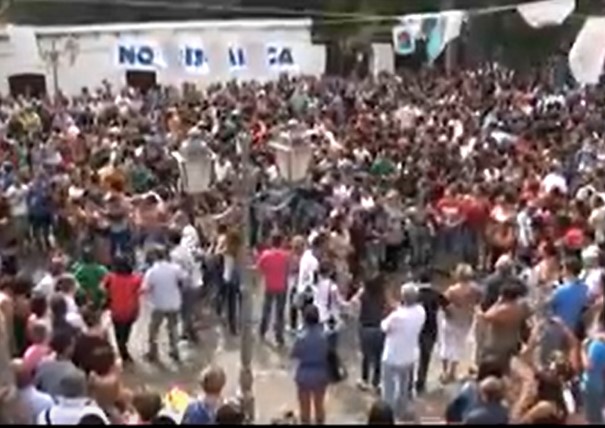
Read the full text page15
See the video 31min à 37 min
ITALY
Region: Sicily ( Sorrentini, Licata, Misterbianco,)
Ethnic group : Sicilians
Spirituality: Catholic
Currently, in Sicily, there are a few documents related to sacred, free dances performed on religious rituals. Two examples of para-liturgical dance have been detected in Misterbianco and Sorrentini during religious festivals
AUTHOR : Dr. Giuseppe Biondo
Dances with boughs and flowers Sicily
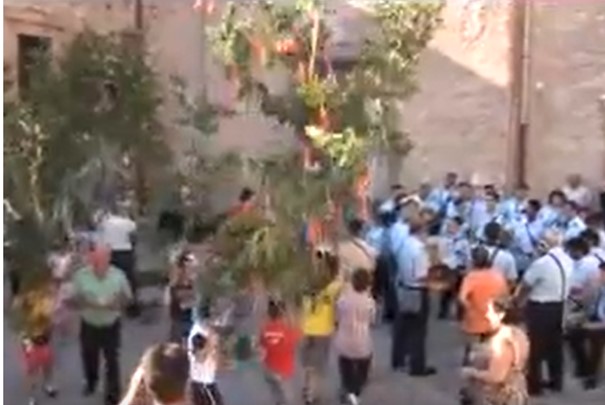
see the video 37 min à 41 min 30 “
ITALY
Region: Sicily
Ethnic group : Sicilians
Spirituality: Catholic
The plant elements in Sicilian religious ceremonies are widespread. On the contrary, it is rare to seewhat happens in San Marco D’Alunzio (in the province of Messina): faithful youngsters dancing in a circle, bearing boughs, accompanied by marches and danceable songs performed by the pipe band.
AUTHOR : Dr. Giuseppe Biondo
Dances with Giants Sicily
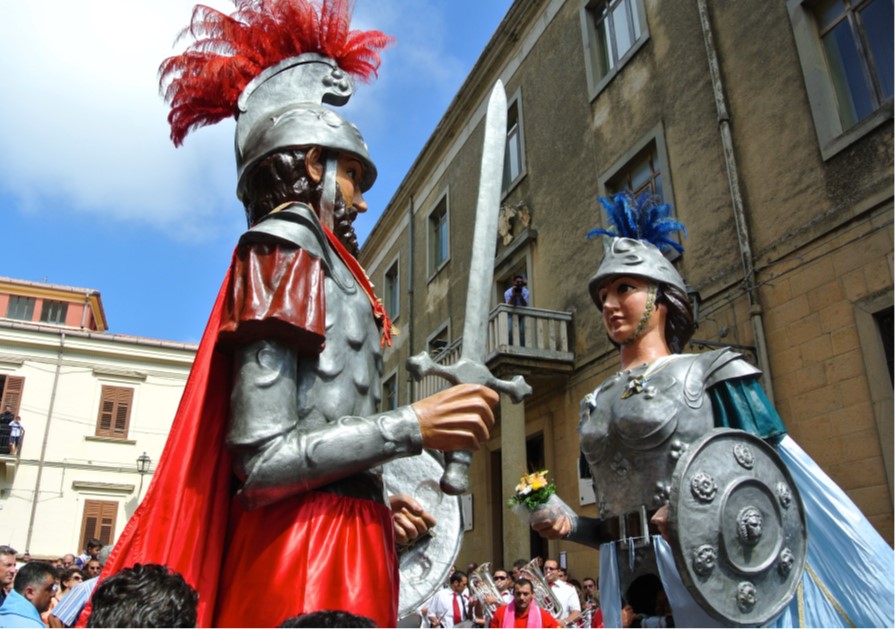
ITALY
Region: Sicily
Ethnic group : Sicilians
Spirituality: Catholic
The Giants – also called Santoni (Santuni) or Sanpaoloni (Sampauluna) are giant statues made of wickerwork, wood and papier-mâché – and the Simulacra of the Apostles, at the time of the encounter between Christ and the Our Lady of Sorrow, constitute the main attraction of Easter Sunday in some religious ceremonial processions of South-Central Sicily. The processional, votive Giants , animated in many local festivals in Western Europe and Latin America, also evoke, out of context, popular characters, animals, mythological figures such as figures of Giants-warriors, who escorted the Madonna in her ceremonial moving to Messina for the feast of the Assumption day (August 15th) (U Giganti e a Gigantissa) and in Mistretta (Gesanti) for the feast of Our Lady of light (6-7-8 September).
Symbolically the Giants and giantesses, spectacular protagonists in organized parades during some religious celebrations, are the custodians of the Christian faith,
Dances of Wild Man and zoomorphic puppets Sicily
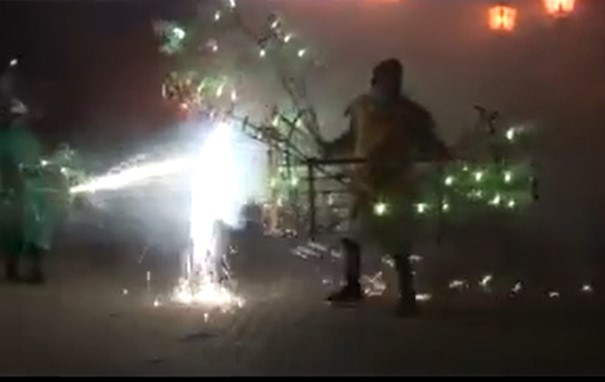
Read the full text pages 19-21
see the video 53 min à 1h22
ITALY
Region: Sicily
Ethnic group : Sicilians
Spirituality: Catholic
It is still a living tradition in Sicily, on religious festivities, the performance of zoomorphic puppets, such as camels, horses or donkeys, in a ‘fireworks dance of purifying fire’. This practice continues to survive in many villages in the province of Messina
The pantomime is made between two contenders: u Camiddu, a camel, more similar to a horse rather than a camel, and the Omu Sabbaggiu, the fierce man. They simulate a fight by moving at the rhythm of a traditional tarantella played by the band
AUTHOR : Dr. Giuseppe Biondo
Carnival Dances Sicily

ITALY
Region: Sicily
Ethnic group : Sicilians
Spirituality: Catholic
the long winter of European peasants is interrupted by a series of spontaneous ceremonials, both ancient and seemingly incomprehensible, of which the best known is certainly Carnival:
The Carnival celebrations are linked to ancient pagan rites, such as the Greek Dionysian (the An thesteria), the Bacchanalian feasts, Saturnalia, Lupercalia…etc were characterized by masked parades, actions centered on social role inversions, acts of sexual performance propitiatory or purifying rites, animal sacrifices, deafening music, singing and dancing, heavy drinking and good feed. These festivals were celebrated at the beginning of the year, in a period between the winter solstice and the approaching of the spring equinox to mark the transition from winter to spring. It symbolically represented the passage from death to life.
Tammurriata
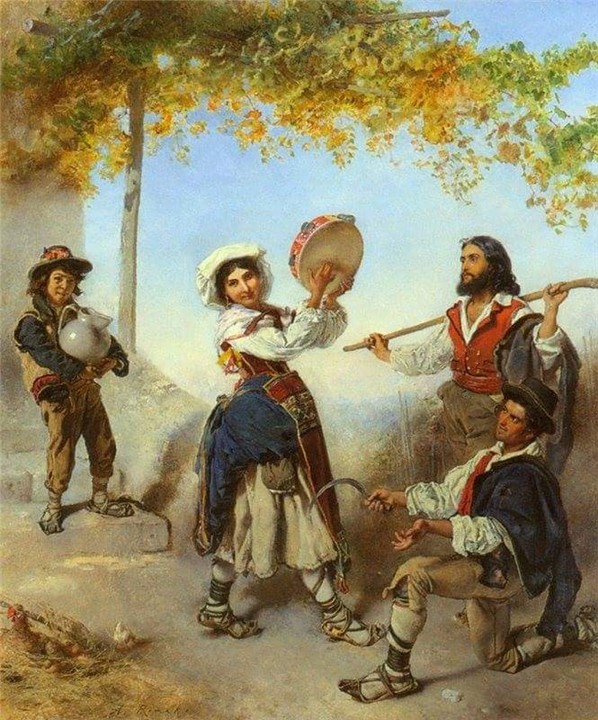
ITALY
Region:Campania
Ethnic group : Italians
Spirituality: Catholic
The tammurriata is a traditional dance from Campania. The term tammurriata represents a complex family of dances performed to the rhythm of the traditional drum: the tammorra
The popular dances of southern Italy, especially those of Campania with the “tammurriata” are today experienced with processions for the Madonna. The dimension of the pagan tradition and that of the Virgin are united in these celebrations
In the document by Ms Sabella seven pilgrims are presented
AUTHOR : Ms Barbara Sabella
Read the full text
See one video
All videos, are included in the recording recording of the seminar
